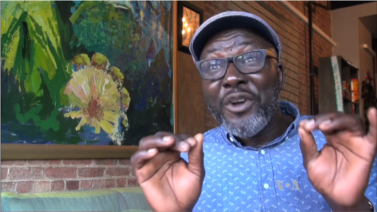
Nigerians protested Tuesday at the National Assembly against a bill they say would punish those who criticize officials and politicians on social media.
Critics say the bill attacks free speech and violates the constitution.
But Senate leaders say critics do not understand the proposed legislation.
Social media and text messaging services like Whatsapp are popular in Nigeria both for communication and for spreading news.
Mausi Segun is an expert on Nigeria and works for Human Rights Watch. She said the bill was written to “stifle, and to have a chilling effect on, freedom of speech.”
Segun said the bill would give officials the power to fine or jail people who publish an “abusive statement” against organizations or individuals. She said she dislikes another part of the bill that would let officials jail someone who spreads, in the bill’s words, “false information.”
People could be sentenced to two to seven years in prison and fined between $10,000 and $25,000.
Segun said Nigeria has laws that punish people for publishing information that is wrong. She says the new bill is not necessary.
She said lawmakers should be working to deal with the Boko Haram terrorist group, violence and corruption rather than trying to limit free speech.
AlJazeera reported that Internet activists, technology experts and rights groups have joined “to call for the withdrawal of (the bill).” They are using the hashtag #NoToSocialMediaBill.
Senator Aliyu Sabi is the chairman of the Senate Committee on Media and Public Affairs. He said many Nigerians misunderstand the intent of the bill.
InformationNigeria.com reported he said the bill was written “to protect all individuals and institutions, including journalists and social media users.” He said “the senate is committed to freedom of speech and a fully inclusive and participatory democracy.”
Sabi said the Senate “is conscious of its responsibility to the people and will not do anything that will stifle participation and inclusion.”
AlJazeera reported the senate president and minority leader support the bill.
Japheth Omojuwa writes often on social media and on blogs. He says he does not believe the bill will become law. But he said “if it gets passed, it puts you in a situation where you’re mentally, subconsciously afraid to question those in authority and those in government.”
He says if the bill is approved he would leave Nigeria.
A senate committee will hold hearings on the bill. Critics and supporters may speak at the hearings. The committee will decide if the full senate should vote on the bill.
If the senate approves it, it must also be approved by the House of Representatives and then signed by the president before it can become law.
But President Muhammadu Buhari does not appear to support the bill. He is a former military leader who suppressed free speech in the 1980s. In a statement posted on Facebook, his spokesman said the president would not support “any legislation that may be inconsistent with the constitution of Nigeria.”
I’m Christopher Jones-Cruise.
Chris Stein in Nigeria reported on this story for VOANews.com. Christopher Jones-Cruise adapted the story for Learning English. He also used reporting by InformationNigeria.com and AlJazeera.com, and information from Human Rights Watch. Kathleen Struck was the editor.
We want to hear from you. Write to us in the Comments Section, or visit our Facebook page.
Words in This Story
stifle – v. to stop (someone) from doing or expressing something
chilling effect – expression. the discouragement of the exercise of rights by the threat of legal action
intent – n. the thing that you plan to do or achieve; an aim or purpose
inclusive – adj. open to everyone; not limited to certain people
subconsciously – adv. being affected by what exists in the part of the mind that a person is not aware of
inconsistent – adj. not always acting or behaving in the same way


